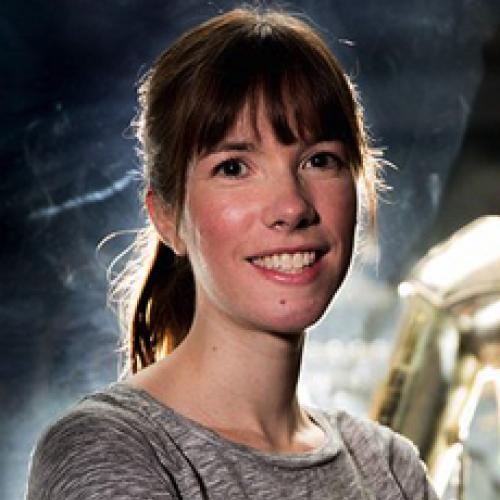Museum Studies
One of the nation’s most prestigious museum studies programs, in the heart of the nation’s capital
Established in 1976, Museum Studies at the George Washington University responds to the evolving museum profession by combining hands-on training with future-focused theoretical engagement. Students gain foundational knowledge about the state of museum work today, practical skills, and the ability to critically engage with developments in the field. Our location in the nation’s capital offers a unique opportunity to connect to national and global conversations at the cutting edge of museum practice.
Coursework offers both breadth and depth in Collections Management, Museum Management, Exhibitions & Visitor Experience, and Public Engagement. Our students come from across the country and a range of academic disciplines, from history and anthropology to art history and the natural sciences.
INFORMATION SESSIONS

Date: Thursday, October 23, 2025 (note: this is a morning session)
Time: 8:00-8:45 a.m.
Location: Online
This session is part of the CCAS Graduate Programs Open House event. Attendees of this session will receive an $80 application fee waiver.

Date: Wednesday, November 12, 2025
Time: 9:00-9:45 p.m.
Location: Online

Date: Tuesday, January 6, 2026
Time: 12:00-12:45 p.m.
Location: Online
OUR PROGRAMS
ADMISSIONS
While our applicants follow the graduate admissions process, each of our programs may have specific requirements. Review the Master of Arts, On-Campus Certificate requirements to understand if you are eligible to apply and what you must include in your application. There are various opportunities through our department and across GW that can help you fund your education. For example:
- MA students may be eligible for partial Dean’s Fellowships.
- Other fellowships are available through the Office of Assistantships & Fellowships.
- The Office of Student Financial Assistance provides information on financial aid options and packages. Many students work while completing the program.
COSTS & FUNDING
The Student Accounts Office provides up to date cost information on our program. We do offer some partial fellowships to MFA students each year. To be considered for a fellowship, you must apply for fall admission. You may also find fellowships through the Office of Fellowships & Assistantships. The Office of Student Financial Assistance also has more information on aid opportunities.
MA in Museums, History & Culture
New Degree Program. This degree will be available starting in fall 2025.
George Washington University’s MA in Museums, History and Culture is a unique joint degree program, drawing on the expertise of faculty in History, American Studies and Museum Studies. The program offers a range of courses emphasizing both historical scholarship and practical application, preparing graduates for careers in museums, historic sites and a range of other public-facing historical programs.
Dual Bachelor of Arts with a Major in Classical and Ancient Near Eastern Studies and Master of Arts in the Field of Museum Studies
The Departments of Classical and Near Eastern Studies and Museum Studies offer a dual bachelor of arts in classical and Near Eastern studies and master of arts in museum studies degree program. The dual program allows students to take 6 graduate credits as part of their undergraduate program, thereby decreasing the number of credits normally required for the master's degree. All requirements for both degrees must be fulfilled.
Dual Bachelor of Arts with a Major in History and Master of Arts in the Field of Museum Studies
The Department of History and Corcoran School of the Arts and Design in the Columbian College of Arts and Sciences together offer a dual bachelor of arts with a major in history and master of arts in the field of museum studies degree program. The programs allow students to take 6 graduate credits as part of their undergraduate degree, thereby decreasing the number of credits normally required for the master's. All requirements for both degrees must be fulfilled.
Students interested in the dual degree program must apply to the master's program in the spring semester of their junior year.
Dual Master of Arts in the Field of Museum Studies and Graduate Certificate in Nonprofit Management
The Museum Studies program and the Trachtenberg School of Public Policy and Public Administration together offer a dual master of arts in the field of museum studies and graduate certificate in nonprofit management program. Nine of the 12 credits required for the certificate may be shared with the master's program. This allows students to earn both credentials in a shorter period and at a lower cost than if pursued separately. All requirements for both programs must be fulfilled.
Museum Studies Overview
Watch an overview video of what the Museum Studies program has to offer. Students describe their experiences across museums, management and exhibitions.
OUR FACULTY
Our faculty are key to our program. Practitioners themselves, they provide an understanding of the knowledge and skills necessary to pursue successful museum careers. Our faculty are also actively involved in projects with their students.
PROFESSOR LAURA SCHIAVO
Professor Schiavo is working with students to research and write a Historic Furnishing Report for the National Park Service Mary McLeod Bethune Council House National Historic Site. This project is part of a cooperative agreement between the National Park Service and GW.
PROFESSOR MARY COUGHLIN
Professor Coughlin is working with conservation scientists from the Smithsonian Institution as well as a student from the Environmental and Green Chemistry program on a Columbian College Facilitating Fund project monitoring deteriorating poly (vinyl chloride) plastics.
PROFESSOR SUSE ANDERSON
Professor Anderson’s research and professional focus is on the intersection of technology and culture, and particularly the impact of digital technologies on the museum.
PROFESSOR MAX VAN BALGOOY
Professor van Balgooy teaches Museum Management, Museums and Community Engagement, Managing People and Projects, and Interpretation of House Museums and Historic Sites.
MUSEUM EXPERIENCES
MEGAN NGUYEN, M.A. '23
Enrolling into graduate school at GW was one of the best decisions I made for my museum career. In my first year, I learned the fundamentals of museum history and theory, as well as the core issues that cultural institutions have and continue to face. My courses in exhibition development and scriptwriting have well prepared me for my summer internship position at The Design Minds, Inc. in Fairfax, VA. Here, I have the opportunity to apply the principles of effective exhibition development into real practice. Through a thoughtful approach, I assist in the research, interpretive planning, and content development for some of the nation’s finest exhibits. As a visitor advocate first and foremost, I am committed to finding creative storytelling techniques for engaging and meaningful museum experiences. I’m extremely grateful for the connections that I’ve made on and off campus thus far, and look forward to building upon my curriculum and practice in my final year. My advice to incoming students would be to utilize all your resources, develop your networking skills, and ask as many questions as you can!
JAKE SANFORD, M.A. '23
At the National Museum of American History, I’ve been working as an intern with collections and curatorial staff to write, edit, develop, edit, and, yes, even occasionally edit an upcoming exhibit. Between that work and my time spent in the museum’s Political and Military History archives, I get a chance to put the curation and collections management skills I’m learning at GW to the test. At the KID Museum, I spend my time as an exhibit developer helping to plan and fabricate new exhibits and building out our on-site 3D modeling lab. Every day at KID’s new location challenges me to think like a child again and put together experiences that entertain and educate in equal measure.
The focus of my work is ensuring that the museum of the future is as innovative and inclusive as our public deserves. Thanks to GW, I’ve had the chance to meet the most compassionate, knowledgeable, and driven professionals working in the field. Together, I know that we can make that vision of the future into a reality.
GABRIELA SEPULVEDA MAIZ, M.A. ’22
Community Engagement work is how I approach restorative justice in museums from the colonial harm historically inflicted on communities. While it is not the end-all, be-all approach to the work (more is needed to accurately tackle restorative justice inside and outside museums), this is the area I've decided to work in. As a Community Engagement Intern at The Phillip Collection, I was able to form an integral part in helping the museum connect with their diverse communities. I directly worked with the communities through art workshops aimed at healing and connection, and I got to work on my own project for the community. My time there put into perspective how delicate and important the work is, and how far we've yet to come.
NORMAN STORER CORRADA, M.A. '22
While at GW, I completed a curatorial internship at the National Museum of American History where I worked under the mentorship of Music Curators John Troutman and Krystal Klingenberg in the Division of Cultural and Community Life. One of my projects consisted of producing a report on the scope and state of the piano collection (the biggest in the U.S.!) to improve its usage. I was also lucky to be able to contribute to improving object records for several string instruments from Puerto Rico (where I’m from) by conducting hands-on research on late-19th and early-20th-century instruments as well as a cuatro belonging to salsa legend Yomo Toro.
During my time as a student, I also worked as a museum teacher at Planet Word, an interactive museum of language arts, where I helped with teaching interactive virtual workshops to K-12 students around the country. I was fortunate to assist the Manager of Education Programs Caitlin Miller with the creation of three new virtual programs that address topics such as the power of storytelling, dialect and linguistic bias, and news literacy.
NICOLE CASART, M.A. '21
I have volunteered at the National Museum of Natural History since 2017 and loved volunteering in the temporary exhibition “Narwhal: Revealing an Arctic Legend” when it was up from August 2017 through January 2020. My interactions with visitors, engagement trainings, and exposure to behind-the-scenes museum work spurred me to pursue a degree in Museum Studies with a focus on Exhibitions and Visitor Experience. Thanks, Mr. Narwhal!
While at GW, I have also worked at the International Spy Museum and interned at the U.S. Botanic Garden, where I researched and drafted an interpretive plan for activities to teach visitors about the evolution, biodiversity, and cultural importance of native Hawaiian plants. I am committed to thinking about how museums can make their collections and staff more representative of and accessible to the communities they serve.
Madeleine Larson, M.A. '21
I acted as the primary processing and rehousing a collection of 19th-century Uzbek ikat coats at the GW Textile Museum. I got to know every thread and crevice of these objects, examining and cleaning them, labeling them, and rehousing them in archival supports. I was blown away by the incredible beauty and technique of the ikat coats. I had never encountered anything like it, especially not as intimately as I could in the Conservation Lab. The contrast of the competing designs and the rich colors of the ikat dyeing are exquisite. Rehousing this piece allowed me to think creatively about where to sew on a label so it was out of sight, how to fold the coat to minimize strain on the fabric, and what size the final storage product would be. As a Collections Management student, I found it a privilege to work hands on with this unique collection and fortify the Museum’s duty of care.
PHOEBE STUCKE
I had the opportunity to intern at the National Museum of Natural History during the summer of 2022 after my first year at GW, where I have gained valuable hands-on experience working with collection objects in the Smithsonian’s Museum Support Center. My project is rehousing a collection of cellulose nitrate film, which in itself is an exciting material to work with! Getting experience with object handling, inventory, condition assessment, and rehousing methods and materials allows me to improve the skills learned in my classes at GW in a practical setting and learn new skills throughout my work. And I have loved experiencing the unique requirements of different types of objects and materials. Doing collections work with photographs under a fume hood is something I would have never predicted!
WHERE OUR GRADUATES WORK
FINE AND DECORATIVE ART MUSEUMS
- National Gallery of Art
- Philadelphia Museum of Art
- J. Paul Getty Museum
HISTORY MUSEUMS AND CENTERS, HISTORICAL SOCIETIES
- Virginia Historical Society
- National Museum of African American History and Culture
- US Holocaust Memorial Museum
HISTORIC SITES
- George Washington's Mount Vernon
- President Lincoln’s Cottage
- Tudor Place Historic House & Garden
- Lower East Side Tenement Museum
NATURAL HISTORY MUSEUMS, SCIENCE CENTERS, AND AQUARIA
- National Museum of Natural History
- Field Museum (Chicago)
- New England Aquarium
OTHER MUSEUMS
- Baseball Hall of Fame
GOVERNMENT AGENCIES AND SITES WASHINGTON DC (AREA)
- United States Supreme Court
- Historic Congressional Cemetery
- Library of Congress
MUSEUM STUDIES AT NEXT
NEXT is the Corcoran's annual celebration of the brilliance and promise of its students. NEXT projects may take many forms—from reflections of students in their interest area to a series of paintings. They represent a student's learning experiences at the Corcoran and a glimpse of their future promise. See the work of Museum Studies students in NEXT.
2024 NEXT PROJECTS and VIEWBOOK
Still in the Fight: DC Statehood and Civil Rights
In 2024, as part of NEXT, Professor Laura Schiavo’s Exhibition Development class created Still in the Fight: DC Statehood and Civil Rights. The show explored the rich history of the DC statehood movement and the enduring struggle for self-government in our nation's capital. Guests had the opportunity to envision a new design for a 51-star flag and vote on local issues that matter to them. They viewed original artifacts, including protest materials and archival documents. The show demonstrated students’ abilities in research, project management, and collaboration. Exhibition Design and Graphic Design students designed and fabricated the show’s physical environment.
Photo by Maria Luz Bravo (New Media Photojournalism '17)
NEWS, HIGHLIGHTS & EVENTS

Laura Schiavo quoted by The Atlantic
February 6, 2026
THE REAL FIGHT FOR THE SMITHSONIAN – Its museums, more than any others, shape the nation’s narrative. No wonder the country argues about it.

Suse Anderson quoted by Christian Science Monitor
February 6, 2026
What do Trump demands mean for Smithsonian’s independence?
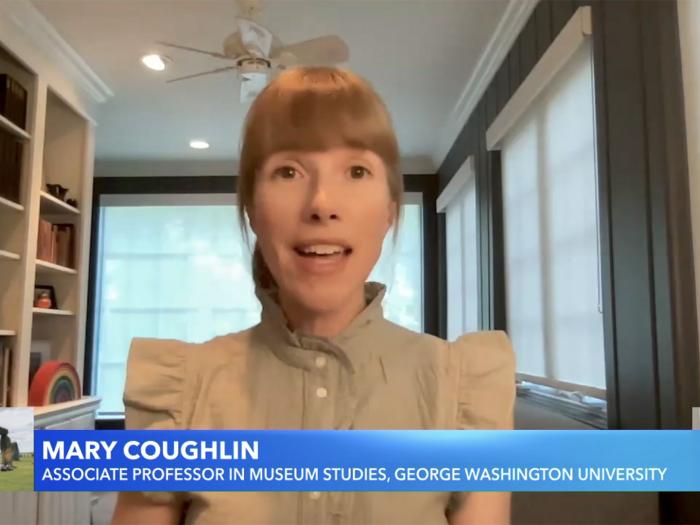
Stonehenge covered in orange paint by climate activists
July 2, 2024
Prof. Mary Coughlin speaks to ABC’s “Good Morning America’’ about vandalism to Stonehenge.
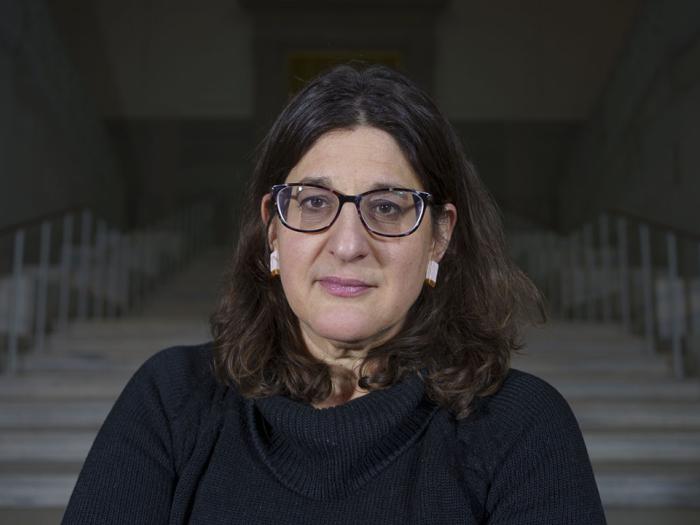
Never Neutral: U.S. Museums Face Historical ‘Reckoning’
February 14, 2024
With museums across the country reexamining their Native American exhibits, Museum Studies Professor Laura Schiavo uncovers a legacy of political and cultural influence.
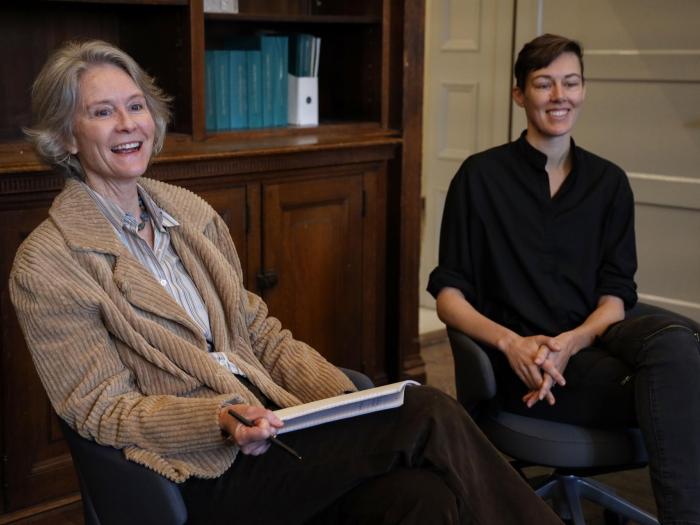
Old School Meets New School in Workshop on Curatorial Strategies
January 25, 2024
Mary Morton of the National Gallery of Art joined Caroline Woolard, Corcoran visiting professor, for discussion.
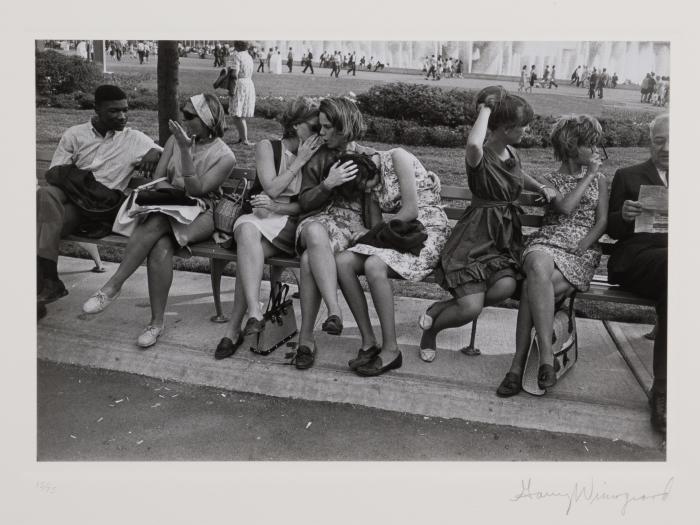
Corcoran Faculty Members Select Works from the GW Collection for Show
October 20, 2023
Artworks chosen by faculty will be displayed on campus through Dec. 16.






